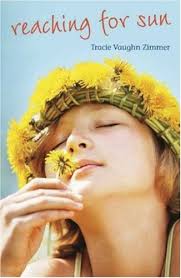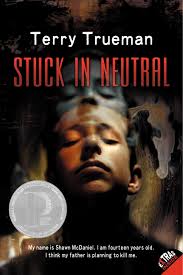In my other blog for
Disability Awareness Month, we looked at scholarly material in book chapter form , with lots of facts
and data about people around the world living with disabilities. They had some personal stories,
but they were often short, and if you want to understand what life is actually
like for people with disabilities, I feel like you should read full stories
about them. There are great nonfiction
and biographical stories out there, but at this library, some of the best
accounts are in YA (Young Adult) fiction stories. Go
figure. Maybe the reason these stories work so well is that none of them
are really all about being disabled. Most of them are more coming-of-age stories
that just happen to have main characters who are deaf or have cerebral palsy
or something. Others are a bit more…dramatic. Which is the best approach to
take? Judge for yourself!
Five Flavors of Dumb by
Antony John
 This is a coming-of-age story about a teen girl dealing with school, her family issues, and
getting ready for college. She is also the manager of a teenage rock band (it’s
set in Seattle, so of course) that she is pretty sure is a total mess. She can’t
be 100 % sure though, considering she’s deaf. The book has two major storylines,
one with the band (and her attempts to get five vastly different people
to come together), and her story with her family, mostly with her troubled
brother (who can hear) and her deaf baby sister, for whom her parents get cochlear
implants so that she can hear. Oh, and her parents used money from her college
fund to do this. Ouch. Our main character, Piper, is a likable protagonist, who
is often pulled between the subculture of deaf Americans, and the more
mainstream world of rock and roll. Hardly a tragic victim, she’s a normal girl, with
issues and flaws and humor, who just happens to be legally deaf. In fact, most
of the book has nothing to do with her disability; it’s more about her relationships
with her band and her family. It’s a relatively light story
about hearing aids, family, and the power of her music helping a young woman grow up.
This is a coming-of-age story about a teen girl dealing with school, her family issues, and
getting ready for college. She is also the manager of a teenage rock band (it’s
set in Seattle, so of course) that she is pretty sure is a total mess. She can’t
be 100 % sure though, considering she’s deaf. The book has two major storylines,
one with the band (and her attempts to get five vastly different people
to come together), and her story with her family, mostly with her troubled
brother (who can hear) and her deaf baby sister, for whom her parents get cochlear
implants so that she can hear. Oh, and her parents used money from her college
fund to do this. Ouch. Our main character, Piper, is a likable protagonist, who
is often pulled between the subculture of deaf Americans, and the more
mainstream world of rock and roll. Hardly a tragic victim, she’s a normal girl, with
issues and flaws and humor, who just happens to be legally deaf. In fact, most
of the book has nothing to do with her disability; it’s more about her relationships
with her band and her family. It’s a relatively light story
about hearing aids, family, and the power of her music helping a young woman grow up.
Reaching for Sun by
Tracie Vaughn Zimmer
 This is less of a
traditional story than the last one, mainly because the whole thing is told in
poetry. But hold on, don’t let that scare you off! The poems, told in accessible
free verse, are used to tell the story of Josie, a 7th grade girl
who lives in an aging farmhouse with her grandmother and her well-meaning but
nagging mother. She also has cerebral palsy, so she has trouble moving one side
of her body, and saying certain words. She has trouble making friends, until
she meets a new boy named Jordan, who she becomes friends with. It’s a lyrical
sort of book, with the problems Josie has being tied up in metaphors and similes,
often linking to gardening or nature, the settings where she feels most
comfortable. Like the previous book, it’s not about feeling bad for the main
character and her struggles, it’s just about a young girl living her life and
trying to figure out her place in the world, while feeling self-conscious about
what makes her different.
This is less of a
traditional story than the last one, mainly because the whole thing is told in
poetry. But hold on, don’t let that scare you off! The poems, told in accessible
free verse, are used to tell the story of Josie, a 7th grade girl
who lives in an aging farmhouse with her grandmother and her well-meaning but
nagging mother. She also has cerebral palsy, so she has trouble moving one side
of her body, and saying certain words. She has trouble making friends, until
she meets a new boy named Jordan, who she becomes friends with. It’s a lyrical
sort of book, with the problems Josie has being tied up in metaphors and similes,
often linking to gardening or nature, the settings where she feels most
comfortable. Like the previous book, it’s not about feeling bad for the main
character and her struggles, it’s just about a young girl living her life and
trying to figure out her place in the world, while feeling self-conscious about
what makes her different.
Stuck in Neutral by Terry
Trueman
 Remember how I said some
of these books were more dramatic than the others? This is a big one. It’s told
from the perspective of 14-year-old Shawn. He likes music and cars and girls,
and is a normal teenage boy. Except one big thing. No one knows he likes these
things, because he has very severe cerebral palsy from brain damage at birth, and can’t
move, feed himself, or even talk. Everyone thinks that, in his head, he has the
intellect of a 3 month old, when in actuality, he is highly intelligent, funny,
and even optimistic. Oh, and he thinks that his father might be trying to kill
him. Not because he hates him, but because he thinks he is constantly
suffering. And there is nothing Shawn can do to stop him. It’s not an easy book,
it talks about how families deal with children with severe disabilities, how
society in general deals with them, and most of all, euthanasia. Look, I am
not going to talk about who is right and who is wrong in this story, or about
euthanasia, but man, this book will get to you. It’s a short read, but by the time you get to the
last chapter, it packs a huge freaking punch.
Remember how I said some
of these books were more dramatic than the others? This is a big one. It’s told
from the perspective of 14-year-old Shawn. He likes music and cars and girls,
and is a normal teenage boy. Except one big thing. No one knows he likes these
things, because he has very severe cerebral palsy from brain damage at birth, and can’t
move, feed himself, or even talk. Everyone thinks that, in his head, he has the
intellect of a 3 month old, when in actuality, he is highly intelligent, funny,
and even optimistic. Oh, and he thinks that his father might be trying to kill
him. Not because he hates him, but because he thinks he is constantly
suffering. And there is nothing Shawn can do to stop him. It’s not an easy book,
it talks about how families deal with children with severe disabilities, how
society in general deals with them, and most of all, euthanasia. Look, I am
not going to talk about who is right and who is wrong in this story, or about
euthanasia, but man, this book will get to you. It’s a short read, but by the time you get to the
last chapter, it packs a huge freaking punch.
The point I am trying to
make is that these books might not be true stories, but they
very well could be. There are millions of people all around the world right now
living with physical and mental disabilities, some extremely severe, others more manageable. Some of them
might be into rock music, or gardening, or just imagining. While these are all Young
Adult books, they have a lot to say to people of all ages, whether you have
experience with disabilities or not.
CP




No comments:
Post a Comment